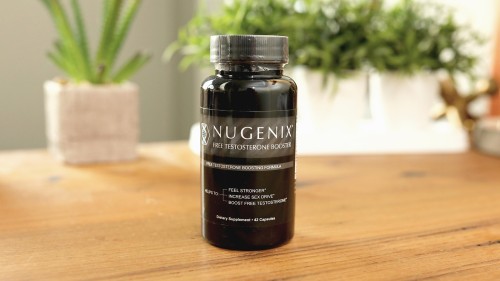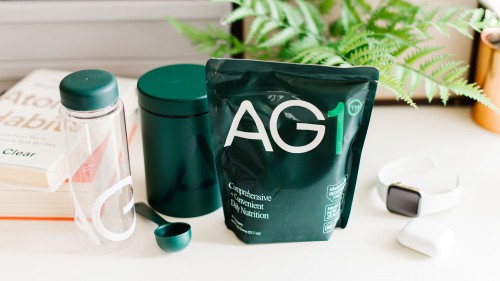A Dietitian Recommends 7 Proven Testosterone-Boosting Foods
Last Updated on April 13, 2021
Medically Reviewed by Anthony Dugarte, MD
Boosting your testosterone levels is more in your control than you may think. Eating a variety of nutrient-dense foods with certain nutrients as part of a healthy diet can increase low testosterone and help you feel your best.


Testosterone is an androgen, a type of hormone that is present in both men and women.
Testosterone is primarily known as an important hormone responsible for developing sex characteristics in men, including a deeper voice, growth of body hair, and male fertility. (1)
It also helps regulate metabolism, muscle mass and strength, overall body composition, red blood cell production, cognition and energy, libido, and more.
Testosterone production typically starts declining after age 30 in men and after menopause in women. These changes can cause negative symptoms and increase the risk of frailty, chronic disease, and infertility.
Choosing hormonal replacement therapy to restore testosterone levels can be a helpful option for men to improve function, but there are many ways to increase testosterone naturally.
In fact, your nutrition and lifestyle choices can greatly influence your levels of testosterone at any age.
I evaluated the current research to find proven foods that help support testosterone levels to maintain your health.
1. Sweet Potatoes
NHANES (National Health and Nutrition Examination Survey) data suggest that vitamin A intake may be related to testosterone levels. (2)
Sweet potatoes are one of the most easily available and versatile foods that contain vitamin A, providing over 700% of the Daily Value in a single medium potato. (3)
Sweet potatoes also contain other nutrients that increase testosterone, like vitamin C, phosphorus, zinc, vitamin D, and some B vitamins.
2. Ginger
Ginger is a root and plant known to have anti-inflammatory properties in the body.
Though more human studies need to be done, there appears to be a promising link between ginger and ginger root extract supplementation and testosterone production.
Ginger helps reduce oxidative stress, normalizes blood glucose, and increases blood flow in the testes to help the body produce testosterone. (4)
3. Olive Oil
Olive oil contains omega-3 fatty acids, which are anti-inflammatory and can benefit cardiovascular health and androgen production.
One study found that young men who had extra-virgin olive oil in their diets for three weeks had increased testosterone levels compared to baseline. (5)
This effect was also found when men had culinary argan oil in their diet, but argan oil is the world’s most expensive edible oil and may not be available for all people.
4. Shellfish
Shellfish are among some of the best foods to boost testosterone production.
Typically, types of shellfish have good to excellent zinc levels; deficiencies of this mineral are tied to low testosterone production.
If you have low zinc, supplementing with zinc and zinc-containing foods can restore testosterone levels.
A serving of oysters has over 650% of the Daily Value of zinc you need daily – the most zinc per serving compared to any other food. (6)
Other shellfish like Alaska king crab, lobster, mussels, and shrimp can provide zinc in your diet.
5. Fortified Milk and Milk Alternatives
Though some of the research is conflicting, there is a possibility that vitamin D may help with testosterone production and fertility. (7, 8)
We have the capability of producing vitamin D through our skin if we spend enough time outdoors exposed to UV light (sunlight), but vitamin D deficiency is still prevalent.
Some easy sources of vitamin D include milk and plant-based milk alternatives. If purchasing a milk alternative, check the Nutrition Facts label to confirm that the vitamin has been added.
6. Nuts and Seeds
Research suggests that magnesium intake is tied to testosterone levels and physical function. (9)
Low serum magnesium is associated with low testosterone, which may affect the onset of disability in older adults. (10)
Some of the best food sources of magnesium include a variety of nuts and seeds. Pumpkin seeds, chia, almonds, cashews, and peanuts are among the top magnesium sources you can include in your diet. (11)
7. Pomegranate Juice
Pomegranate juice is rich in potent antioxidants (called punicalagin) that may be beneficial for testosterone production.
One study found that drinking 500mL of pure pomegranate juice daily for two weeks helped relieve stress and increased salivary testosterone in both men and women. (12)
Additional Lifestyle Habits That Are Known to Help
Regular Exercise
Engaging in regular, but not excessive, exercise can naturally boost testosterone.
Testosterone levels appear to be higher in individuals who are physically active compared to sedentary adults. (13)
One study found that overweight and obese men who completed a 12-week lifestyle program based on aerobic activity and calorie restriction and maintained high physical activity had greater increases in serum testosterone than those with low activity. (14)
Adults should get at least 150 minutes of moderate-intensity (or 75 minutes of vigorous-intensity aerobic activity) and additional muscle-strengthening activities during the week for maintenance. (15)
To lose weight, up to 300 minutes of aerobic and muscle-strengthening exercise is recommended weekly.
Getting Adequate Sleep at Night
Though you may be getting much accomplished during your day, a lack of sleep may be draining your testosterone at night.
Research finds that impaired sleep (that is, having less than 6 hours of sleep per night) is associated with decreased testosterone levels. (16)
The reductions in testosterone are larger for every hour of sleep lost, so to keep your T, it’s important to catch some Zs.
To boost testosterone, aim to get between 7 to 9 hours of sleep per night. (17)
The Bottom Line
Supporting your body’s natural production of testosterone does not have to be complicated.
In the end, it comes down to having a balanced diet, regular exercise, and adequate sleep.
These things, combined with stress management, may also positively impact weight management – fat mass and testosterone are known to have an inverse relationship with each other. (18)
If you have a history of conditions related to hormonal imbalances and need specialized care, consult with an endocrinologist to come up with a plan for your health.
A registered dietitian can also help you find an eating pattern that includes foods to support your hormonal health.
A Mediterranean Diet, which includes many of the foods listed above, may be a good place to start if you’re looking to include more testosterone-boosting foods in your meals.
At WellnessVerge, we only use reputable sources, including peer-reviewed medical journals and well-respected academic institutions.
- The many faces of testosterone:
https://www.ncbi.nlm.nih.gov/pmc/articles/PMC2686330/ - Environment-wide association study to comprehensively test and validate associations between nutrition and lifestyle factors and testosterone deficiency: NHANES 1988-1994 and 1999-2004:
https://pubmed.ncbi.nlm.nih.gov/32077039/ - Sweet potato, NFS:
https://fdc.nal.usda.gov/fdc-app.html#/food-details/1103233/nutrients - Ginger and Testosterone:
https://pubmed.ncbi.nlm.nih.gov/30360442/ - Effect of argan and olive oil consumption on the hormonal profile of androgens among healthy adult Moroccan men:
https://pubmed.ncbi.nlm.nih.gov/23472458/ - Zinc Fact Sheet for Health Professionals:
https://ods.od.nih.gov/factsheets/Zinc-HealthProfessional/ - Reviewing the Evidence on Vitamin D Supplementation in the Management of Testosterone Status and Its Effects on Male Reproductive System (Testis and Prostate): Mechanistically Dazzling but Clinically Disappointing:
https://pubmed.ncbi.nlm.nih.gov/32446600/ - MECHANISMS IN ENDOCRINOLOGY: Vitamin D and fertility: a systematic review:
https://eje.bioscientifica.com/view/journals/eje/166/5/765.xml - Relationship between serum magnesium concentration and metabolic and hormonal disorders in middle-aged and older men:
https://pubmed.ncbi.nlm.nih.gov/26507751/ - The Interplay between Magnesium and Testosterone in Modulating Physical Function in Men:
https://pubmed.ncbi.nlm.nih.gov/24723948/ - Magnesium Fact Sheet for Health Professionals:
https://ods.od.nih.gov/factsheets/Magnesium-HealthProfessional/ - Pomegranate juice intake enhances salivary testosterone levels and improves mood and well being in healthy men and women:
https://www.researchgate.net/publication/275716515_Pomegranate_juice_intake_enhances_salivary_testosterone_levels_and_improves_mood_and_well_being_in_healthy_men_and_women - Physically active men show better semen parameters and hormone values than sedentary men:
https://pubmed.ncbi.nlm.nih.gov/22234399/ - Increased physical activity has a greater effect than reduced energy intake on lifestyle modification-induced increases in testosterone:
https://www.ncbi.nlm.nih.gov/pmc/articles/PMC4706091/ - How much physical activity do adults need?:
https://www.cdc.gov/physicalactivity/basics/adults/index.htm - Impaired sleep is associated with low testosterone in US adult males: results from the National Health and Nutrition Examination Survey:
https://link.springer.com/article/10.1007/s00345-018-2485-2 - National Sleep Foundation's sleep time duration recommendations: methodology and results summary:
https://pubmed.ncbi.nlm.nih.gov/29073412/ - Testosterone and obesity:
https://pubmed.ncbi.nlm.nih.gov/25982085/






